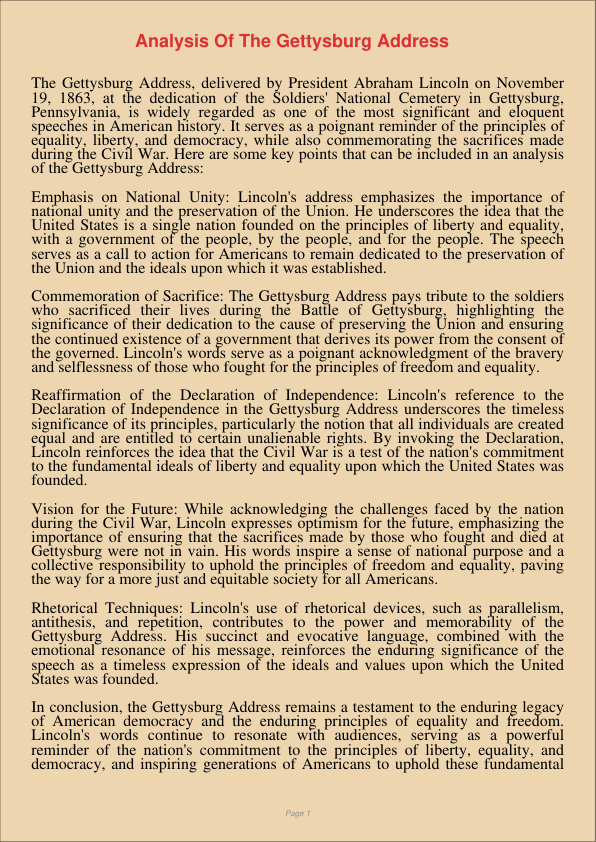Analysis Of The Gettysburg Address
Dec 31, 2023
gettysburg address
analysis
Marketing
Health Sciences & Medicine

The Gettysburg Address, delivered by President Abraham Lincoln on November 19, 1863, at the dedication of the Soldiers’ National Cemetery in Gettysburg, Pennsylvania, is widely regarded as one of the most significant and eloquent speeches in American history. It serves as a poignant reminder of the principles of equality, liberty, and democracy, while also commemorating the sacrifices made during the Civil War. Here are some key points that can be included in an analysis of the Gettysburg Address:
Emphasis on National Unity: Lincoln’s address emphasizes the importance of national unity and the preservation of the Union. He underscores the idea that the United States is a single nation founded on the principles of liberty and equality, with a government of the people, by the people, and for the people. The speech serves as a call to action for Americans to remain dedicated to the preservation of the Union and the ideals upon which it was established.
Commemoration of Sacrifice: The Gettysburg Address pays tribute to the soldiers who sacrificed their lives during the Battle of Gettysburg, highlighting the significance of their dedication to the cause of preserving the Union and ensuring the continued existence of a government that derives its power from the consent of the governed. Lincoln’s words serve as a poignant acknowledgment of the bravery and selflessness of those who fought for the principles of freedom and equality.
Reaffirmation of the Declaration of Independence: Lincoln’s reference to the Declaration of Independence in the Gettysburg Address underscores the timeless significance of its principles, particularly the notion that all individuals are created equal and are entitled to certain unalienable rights. By invoking the Declaration, Lincoln reinforces the idea that the Civil War is a test of the nation’s commitment to the fundamental ideals of liberty and equality upon which the United States was founded.
Vision for the Future: While acknowledging the challenges faced by the nation during the Civil War, Lincoln expresses optimism for the future, emphasizing the importance of ensuring that the sacrifices made by those who fought and died at Gettysburg were not in vain. His words inspire a sense of national purpose and a collective responsibility to uphold the principles of freedom and equality, paving the way for a more just and equitable society for all Americans.
Rhetorical Techniques: Lincoln’s use of rhetorical devices, such as parallelism, antithesis, and repetition, contributes to the power and memorability of the Gettysburg Address. His succinct and evocative language, combined with the emotional resonance of his message, reinforces the enduring significance of the speech as a timeless expression of the ideals and values upon which the United States was founded.
In conclusion, the Gettysburg Address remains a testament to the enduring legacy of American democracy and the enduring principles of equality and freedom. Lincoln’s words continue to resonate with audiences, serving as a powerful reminder of the nation’s commitment to the principles of liberty, equality, and democracy, and inspiring generations of Americans to uphold these fundamental values in the pursuit of a more just and equitable society.